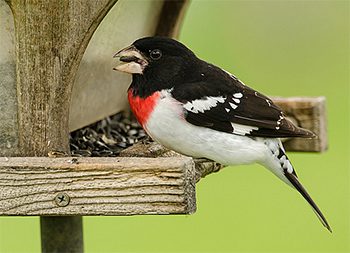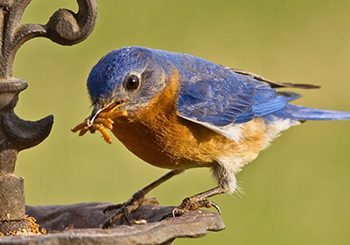One of the most common myths in the birdwatching community is that you shouldnt feed birds during the summer. Some birders reason that with an abundance of food sources during the warmer months, continuing to provide seeds and other foods will make the birds lazy and stop seeking out natural food sources. The truth is that keeping feeders running during the summer months will not make your backyard birds dependent. In fact, studies have found that birds only receive a quarter of their daily nutrition from feeders. For some species of birds, this percentage may be even lower.
Sunflower Seeds for Grosbeaks

One of the best reasons to keep your seed feeders filled in the summer is because of grosbeaks. The males are attractive, dressed in formal black-and-white attire with a splash of colorrose-breasted grosbeaks have a red chest patch, while black-headed grosbeaks have warm cinnamon-orange bodies. Both species’ dull, mottled brown females can be mistaken for finches or sparrows. Grosbeaks are seed-eating machines. While they will consume millet, their favorite food is classic black-oil sunflower seeds.
How come grosbeaks have such large beaks? Better to eat big seeds with, my dear One of the iconic birds with beaks that reveal what they eat is the grosbeak; large, powerful beaks work best for breaking through seed hulls. Another important food source for them is insects and grasshoppers, which their beaks are also quite adept at crushing. The large beak of a female grosbeak is the first indicator that it’s not a finch or a sparrow, which have much smaller beaks.

Many people entice bluebirds to take up residence on their property by putting up nest boxes (also called birdhouses). If you have bluebirds in your neighborhood, you can get an up-close look at them by setting a few mealworms out on your platform feeder. Bluebirds are insectivores, and an offering of a few mealwormsalive or driedis a protein boost thats hard to resist, especially during the energy-intensive breeding season.
If you catch fish with wax worms, leave them out for bluebirds. Here’s what to do with leftover fishing bait. Bluebirds can consume both mealworms and wax worms; in fact, some people claim that bluebirds will choose to eat the wax worms from a pile of mealworms.
The Benefits of Feeding Birds in the Summer
The majority of people associate fall and winterwhen birds need food before migrating and when the changing of the seasons may result in a shortage of naturally occurring food sourceswith backyard feeders. Nonetheless, feeding backyard birds in the summer has a number of advantages:
- With longer daylight hours, birdwatchers have more time to go outside and observe their feeders.
- Birds in their breeding plumage, which has vivid colors and distinct markings, will make it easier to identify different species of birds. This is especially useful for novice birdwatchers who are just starting to learn what birds are coming to their backyard.
- Birds are raising their families in the summer, and birdwatchers can watch from a close distance as nestlings grow and learn to feed themselves at backyard feeders.
- In northern regions, summer provides backyard birdwatchers with an opportunity to observe a wider variety of birds than they would if they limited their bird feeding to the winter months.
1. Keep Your Bird Feeder Safe in the Summer Heat
You can feed your birds wholesome food without having to make significant changes to your backyard feeders. You can provide birds with a nutritious diet and secure eating areas by following these four easy tips:
- Keep your seed dry. Hot and humid weather is the perfect condition for mold. Aflatoxin is a byproduct that mold can produce that is fatal to birds. Just fill your feeders halfway, and refill them often, to avoid mold growth. Feeders that are “packed to the gills” run the risk of becoming moldy if left out for too long. If you discover any mold on your seed, discard it and use warm water and a mild soap solution to clean your feeder. Rinse thoroughly and dry completely before filling again.
- Move suet feeders to shady locations. Even though some packaged suet isn’t melted, spoiling is still a possibility. Another danger is that the sun softens suet, which can damage a bird’s feathers in intense heat. If you’re not sure whether to use suet in the summer, you might want to use a hummingbird feeder.
- Keep feeders cleanespecially in the summer. To provide your backyard birds with a clean, sanitized feeder, wash your feeders on a regular basis every two weeks. Disassemble your feeders and give them a wash in boiling water with soap or a weak solution of bleach. Alternatively, you can place the feeders in the dishwasher on a hot cycle. Whichever option you select, make sure to completely rinse and give it time to dry before adding more.
- Keep feeders in a shaded area. This will reduce the amount of spoiled seed and keep birds cool, enticing them to come more often and eat for longer periods of time.
- Reduce sun glare. During the summer, a flying bird may become confused by the sun’s glare. Ensure that your feeders are oriented with respect to the direction of the sun to protect guests from window strikes. By placing windsocks, sun catchers, and decals in front of windows, you can use anti-reflective techniques to increase the visibility of your windows.
FAQ
Is it OK to feed birds in summertime?
When should you not feed birds?
Should I put water out for birds in summer?
How can I help my bird in hot weather?